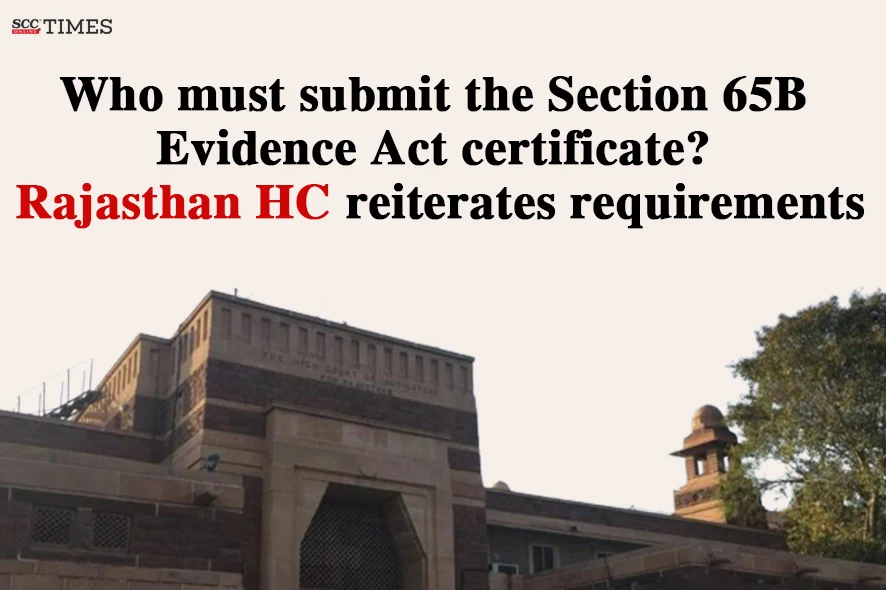Rajasthan High Court: In a civil writ petition filed by the petitioner against the order of the Rent Tribunal permitting the respondent to present electronic evidence along with a certificate issued by himself under Section 65-B of the Evidence Act, 1872, a Single Judge Bench of Anoop Kumar Dhand, J., held that a certificate under Section 65-B of the Evidence Act, 1872 must be provided by the person who originally recorded the video, not by the person to whom the recording was subsequently transferred.
Background
The case arose from an application filed by the respondent against the petitioner before the Rent Tribunal under Section 21 of the Rajasthan Rent Control Act, 2001. The Tribunal allowed the respondent to produce electronic evidence in the form of a Pen Drive and a CD. These were submitted along with a certificate under Section 65-B of the Evidence Act, 1872 issued by the respondent himself.
Aggrieved by the decision of the Tribunal allowing the electronic evidence, the petitioner filed the present petition. The petitioner argued that the original recording was made on the device of another person and therefore, the certificate required under Section 65-B should have been issued by him and not the respondent.
Analysis and Decision
The Court observed that the video in question was recorded someone else’s device and subsequently, the said video was transferred from his device to the device of the respondent who produced the relevant Pen Drive and CD on the record. Then at a later stage a certificate under Section 65 B of the Evidence Act was submitted by the respondent in support of the electronic evidence.
The Court observed that the primary consideration was to determine,
“Whether it is mandatory that a certificate of the person, in whose device the original video was recorded, was required to be submitted under Section 65-B of the Indian Evidence Act or the person in whose device the material has been transferred to, is supposed to issue the certificate under Section 65-B of the Indian Evidence Act?”
The Court noted that the above question was decide by the Supreme Court in Anvar P.V. v. P.K. Basheer, (2014) 10 SCC 473, wherein it was categorically held that ‘such certificate has to be personally signed by the person, who was occupying the relevant device’. This view was again reiterated in Arjun Panditrao Khotkar v. Kailash Kushanrao Gorantyal, (2020) 7 SCC 1, and the Supreme Court further held that, ‘in cases where either a defective certificate is given, or in cases where such certificate has been demanded and is not given by the concerned person, the Judge conducting the trial must summon the person/persons referred to in Section 65B(4) of the Evidence Act, and require that such certificate be given by such person/persons.’
The Court concluded that the certificate submitted by the respondent was not valid because the video was not originally recorded on his device. Further, for the evidence to be admissible, the certificate was required to be submitted by such person on whose device it was recorded.
The Court, while quashing the Tribunal’s order, observed that since the electronic evidence was already on record, the respondent was at liberty to submit a certificate from the person on whose device it was originally recorded.
[Shwetabh Singhal v. J.K And Sons, S.B. Civil Writ Petition No. 12210/2025, decided on 09-09-2025]
Advocates who appeared in this case:
For Petitioner: Govind Purohit, Advocate
For Respondents: Poonam Chand Bhandari, Advocate







